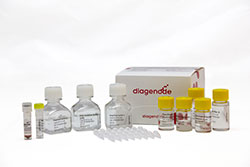Dhat R. et al.
BACKGROUND: Diabetic cardiomyopathy (DCM) is a leading cause of death in diabetic patients. Hyperglycemic myocardial microenvironment significantly alters chromatin architecture and the transcriptome, resulting in aberrant activation of signaling pathways in a diabetic heart. Epigenetic marks play vital roles in transcriptional reprogramming during the development of DCM. The current study is aimed to profile genome-wide DNA (hydroxy)methylation patterns in the hearts of control and streptozotocin (STZ)-induced diabetic rats and decipher the effect of modulation of DNA methylation by alpha-ketoglutarate (AKG), a TET enzyme cofactor, on the progression of DCM. METHODS: Diabetes was induced in male adult Wistar rats with an intraperitoneal injection of STZ. Diabetic and vehicle control animals were randomly divided into groups with/without AKG treatment. Cardiac function was monitored by performing cardiac catheterization. Global methylation (5mC) and hydroxymethylation (5hmC) patterns were mapped in the Left ventricular tissue of control and diabetic rats with the help of an enrichment-based (h)MEDIP-sequencing technique by using antibodies specific for 5mC and 5hmC. Sequencing data were validated by performing (h)MEDIP-qPCR analysis at the gene-specific level, and gene expression was analyzed by qPCR. The mRNA and protein expression of enzymes involved in the DNA methylation and demethylation cycle were analyzed by qPCR and western blotting. Global 5mC and 5hmC levels were also assessed in high glucose-treated DNMT3B knockdown H9c2 cells. RESULTS: We found the increased expression of DNMT3B, MBD2, and MeCP2 with a concomitant accumulation of 5mC and 5hmC, specifically in gene body regions of diabetic rat hearts compared to the control. Calcium signaling was the most significantly affected pathway by cytosine modifications in the diabetic heart. Additionally, hypermethylated gene body regions were associated with Rap1, apelin, and phosphatidyl inositol signaling, while metabolic pathways were most affected by hyperhydroxymethylation. AKG supplementation in diabetic rats reversed aberrant methylation patterns and restored cardiac function. Hyperglycemia also increased 5mC and 5hmC levels in H9c2 cells, which was normalized by DNMT3B knockdown or AKG supplementation. CONCLUSION: This study demonstrates that reverting hyperglycemic damage to cardiac tissue might be possible by erasing adverse epigenetic signatures by supplementing epigenetic modulators such as AKG along with an existing antidiabetic treatment regimen.


